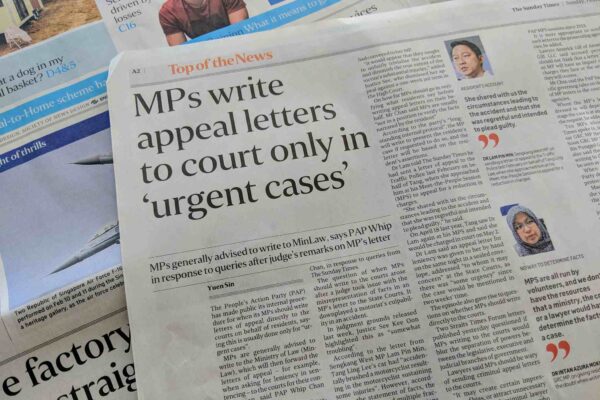
A brave judge has described an MP’s appeal letter as “somewhat troubling” and “regrettably misleading”. *clap* *clap* *clap* I’ve often wondered, what’s the deal with these MP letters anyway, why do people ask MPs to write all sorts of letters, and why do MPs agree to write all those letters at all?
I can appreciate when residents require help writing letters because they are unable to do that themselves, or they don’t know how to do that themselves, or they need help with some bureaucratic issues that the MP is better positioned to navigate through. Or perhaps they need the weight of an MP’s voice to bring a relatively small, yet important, citizen matter to the right level within the government.
However, often times, we see educated persons approaching MPs for not-so-serious matters. Something simply didn’t work out the way they wanted, and they want their MPs to fix it for them. Seriously, are the MP letters supposed to work some magic? Do they carry more weight than an ordinary citizen?
I thought we lived in a meritocratic society. Yet, it’s not uncommon to hear stories of people who ask their MPs to write letters for all sorts of trivial matters, such as to waive fines. Why is it that the person himself, or herself, cannot get things done on their own, but require the backing of an MP to change the outcome?
There’s, of course, how things should be, and how things actually are. There are unwritten rules, or back-channels, that you don’t talk about.
However, I’m surprised, and disappointed, to read from the Straits Times (4 Feb 2018) a statement from Chan Chun Sing, Minister in the Prime Minister’s Office, in relation to this case:
MPs are generally advised to write to the Ministry of Law (MinLaw), which will then forward the letters of appeal – for example, when asking for leniency in sentencing – to the courts for their consideration
Does the appeal from the defendant not count? Would it help if the defendant’s lawyer wrote in to the Ministry of Law? I fail to understand why the Ministry of Law, much less the MP, should have an effect of how the courts handle the case.
In fact, in the same article, it was reported that MP Lam Pin Min had written a letter of appeal to the Traffic Police on behalf of the defendant for a reduction in charges. Is this a suggestion, here, that the Traffic Police would entertain the matter at all? Why should an appeal by the defendant herself be given less consideration?
I can completely understand MPs aiding a resident who does not know how to write letters, or does not know the appropriate channels for making the appeal themselves. I can understand when an important, well-respected, well-recognised, figure serves as a character witness to another person, possibly to establish some background facts surrounding a case for the consideration of the court. It doesn’t sound like any of these are the case in this instance.
I find it preposterous that PAP thinks their MPs do have a role writing appeals for their constituents, including to appeal directly to the courts in “urgent cases”. Or that they could appeal to the Attorney-General’s Chambers not to pursue charges.
As a matter of curiosity, would an appeal letter from an opposition-party MP be considered differently?
